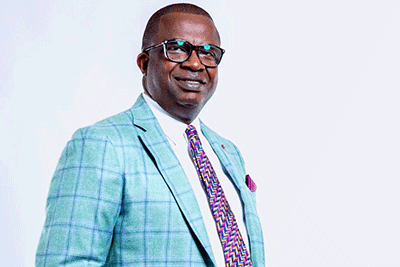Fertility Talk With Dr Abayomi Ajayi: Menopause Should Not Stop You From Becoming A Parent
Fertility Talk With Dr Abayomi Ajayi: Menopause Should Not Stop You From Becoming A Parent

Menopause is that time when permanent cessation of menstruation occurs following the loss of ovarian activity. The average age for menopause is 48 – 50 years, although it actually ranges from 45 – 55 years depending on a number of factors. it is important to note that before eventual cessation of menstrual flow, there is a gradual reduction in the function of the ovaries. This is called the climacteric period, climacteric meaning ladder. This is the ten years leading to the menopause Early menopause occurs in women who smoke and those with a genetic predisposition, for instance mother and daughter experiences menopause at about the same age. The symptoms experienced at menopause are due to the reduction in the level of female sex hormones. These ranges from hot flushes and night sweats to psychological symptoms like anxiety, tension, mood changes and irritability. Others like sleep disturbances and early morning waking, dry changes in skin and genital tract as well as prolonged health problems like weakness of bones leading to fractures and elevated blood pressure leading to heart diseases and stroke are not uncommon.
At this point in every woman’s life, her hormone production drops below the level required to continue her periods. For some women it is a welcome development, even though it affects their sex life, triggers mood swings, causes hot flashes or even takes them down the road to bone and heart problems. If menopause occurs suddenly as it may when it is caused by medical interventions such as removal of the ovaries or during treatment for other conditions such as ovarian or breast cancers, it may feel like a disease even worse than the original disease. The good news is that there are ways to manage symptoms and live more comfortable with menopause. Many things can be done to help ease the way through menopause. Interventions such as life style modifications (diet, exercise, smoking cessation and attitude) may be just as important or as effective as medication in helping you feel better and live longer.
For many women, the menopausal symptoms are even more painful because it more or less puts an end to their reproductive desires. Thanks to advances in medical technology this does not have to be so, we know they can get back in the baby chase, and that it’s never too late to give birth, a thought that feels weird, hopeful, right and wrong all at the same time.
In order to achieve conception in postmenopausal women, we need to answer a few questions. To determine if the woman is fit enough to carry a pregnancy, we have to determine the source of the eggs to be used and also determine the source of the sperm to be used.
Most centres have a cut off age after which they are not willing to take women for assisted conception service, a several years ago the celebrated age of the oldest woman in the world 72 years old made the headlines. She had a baby successfully but became bed ridden subsequently. Apart from the cut off age most centres also insist on a comprehensive medical evaluation to be done to ascertain that these dear women can indeed carry a conception without compromising their health status for women in whom any pathology is detected, these should be addressed before going ahead into the fertility treatment. If they are not fit physically for conception, they may want to consider the option of donor uterus which is also known as surrogacy. After ascertaining this, the other decision is to ascertain the source of the eggs to be used for the treatment, it is practically impossible to use own eggs in the post menopausal woman. The question here is, are we using eggs from a known oocyte donor, (for example a relation) or an unknown donor? For obvious reasons, most couples from our part of the world prefer unknown oocyte donors. If her husband has viable sperms, this can be used for the treatment; otherwise consideration has to be given to donor sperm.
The first step in the entire process is preparing the lining of the womb with the female hormone oestrogen for the embryo implantation process ,when this is ascertained, the oocyte donor is then stimulated to produce many eggs, these are collected during a minor surgical procedure which is carried out through the vagina under ultra sound scan guidance. The collected eggs are carefully prepared and inseminated with sperms to achieve fertilization. The embryo may stay outside the womb for three to six days as the case may be and then they are carefully returned back into the womb also under ultra sound scan guidance. Medications are continued to support the lining of the womb and encourage implantation. In ten to fourteen days a blood pregnancy test will be conducted to ascertain if implantation and conception has indeed occurred. Chance of successful pregnancy in this group of women is as high as 45-50% in the same range as occurs in women that are less than 30 years old. There is nothing like achieving a lifelong dream especially when nature seems to have said time is up. In no other aspect of human life is this shown as it is in postmenopausal pregnancy.



